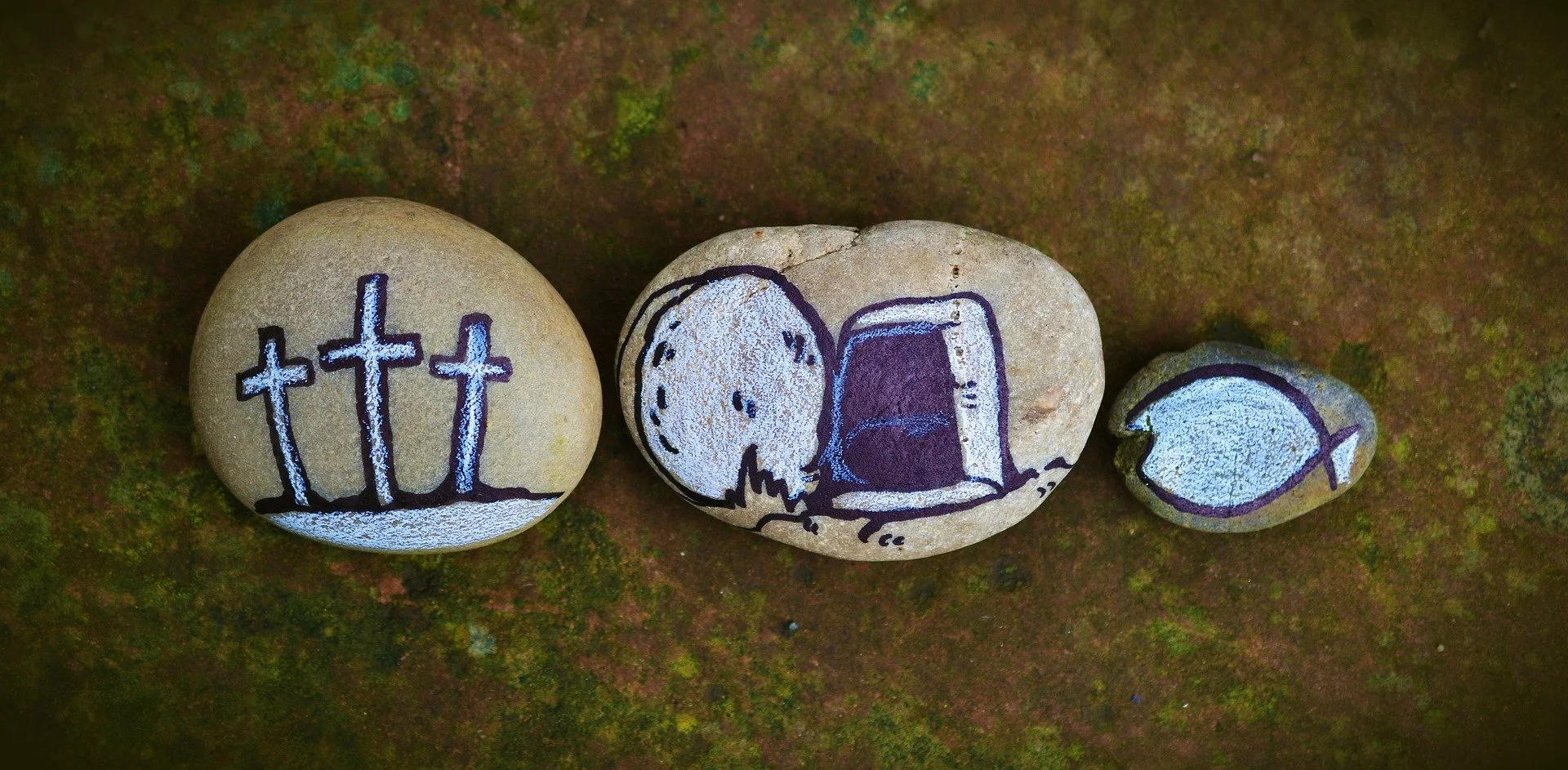Embracing Sadness and Finding Joy: A Study of our Life in Jesus During the Holidays - Part 1: Embracing the Sad
The Holy Spirit inspired me one morning while I was doing my devotions to put together a short series for the month of December. The holidays can be a wonderful time of year, filled with activity, family and friends. However, for many, they can also be a time of great sadness and depression. People who have experienced loss can feel the holidays to be more of a prison, than a time of levity and light. Christmas, while exciting and full of anticipation, can become dark and foreboding for people who are struggling.
Image by patrycja1670 from Pixabay
In this post, I want to look at a few important points to remember when we are maneuvering the holidays, whether we are experiencing sadness ourselves, or we are walking with others through their feelings of grief and anxiety.
1 - Sadness is an emotion God gave us.
Being created in the image of God we were made, not to be robots programed from the great beyond with no ability to show emotion, but to have a broad range of feelings from happiness and joy, to fear and worry, to anger and frustration. Emotions were given to us, not to make us weak, but to give us greater strength to survive, live and to have a relationship with others and with our Creator.
“26 Then God said, “Let us make man in our image, after our likeness. And let them have dominion over the fish of the sea and over the birds of the heavens and over the livestock and over all the earth and over every creeping thing that creeps on the earth.”
27 So God created man in his own image,
in the image of God he created him;
male and female he created them.”
How would we have relationships without emotion? How would we know the emotion of peace, if we did not experience fear? How would we know the feeling of joy if we did not experience sorrow? How would we know love if we did not experience loss?
Emotions are a part of who we were created to be, and when given over to God, can be an integral part in making us whole as a person, and more suited to serve God and others. Here is a good article from Focus on the Family - What Does the Bible Say About Emotions?
2 - Sadness needs to be acknowledged and felt.
In one of my therapy sessions a few months ago, I told my counselor that my husband and I often feel we are experiencing “existential fatigue in the land of eternal sadness.” She thought that was a very interesting way to describe our lives at that point in time. She went on to explain that sadness was not a bad thing. In fact feeling sad was how our minds acknowledged that something was or is very important to us.
Grief is a very real emotion and is felt by more than just someone who has lost a loved one. Grief is felt by partners who are in the midst of divorce; by children who now have to split their time between parents; by the man who just lost his job of 30 years; by the woman who lost a breast to cancer; and even by the employee who now has to learn yet another new computer program to do their work. The difficulty comes when we push the sadness down and try to get past it without truly processing it.
When my father passed away back in 2006, I had never really experienced grief before other than the loss of a pet. I had never known my maternal grandparents, and we did not see my paternal grandparents all that often. When my grandfather died, I was pretty young, and when my grandmother passed I was in college and didn’t even get home for her funeral. However, my dad passing away was different. I remember quite distinctly wondering if he was cold as he lay in that grave that first cold January night after he was buried.
Image by H A R M O N I A P I C T U R A from Pixabay
I began a grief journal which allowed me to process, and I began to think of grief as a blanket. When I needed to feel that sadness, I would wrap up in that imaginary blanket and feel the pain. I would remember good things and even some of the bad about my dad and growing up as the youngest of three. When I felt I processed enough for a while, I would mentally fold the blanket back up and put it in an imaginary trunk where it would be ready for the next time I needed it.
We see the psalmist in the Old Testament grieving out loud in many of the psalms. Let’s look at a few.
“1 I cry aloud to God,
aloud to God, and he will hear me.
2 In the day of my trouble I seek the Lord;
in the night my hand is stretched out without wearying;
my soul refuses to be comforted.
3 When I remember God, I moan;
when I meditate, my spirit faints. Selah
4 You hold my eyelids open;
I am so troubled that I cannot speak.
5 I consider the days of old,
the years long ago.
6 I said, “Let me remember my song in the night;
let me meditate in my heart.”
Then my spirit made a diligent search:
7 “Will the Lord spurn forever,
and never again be favorable?
8 Has his steadfast love forever ceased?
Are his promises at an end for all time?
9 Has God forgotten to be gracious?
Has he in anger shut up his compassion?” Selah”
In this psalm the writer is so grieved he feels that God has forgotten him. God is not offended by these feelings. He knows our hearts and He wants us to acknowledge these feelings and bring them to Him.
“1 Save me, O God!
For the waters have come up to my neck.
2 I sink in deep mire,
where there is no foothold;
I have come into deep waters,
and the flood sweeps over me.
3 I am weary with my crying out;
my throat is parched.
My eyes grow dim
with waiting for my God.”
I think most of us have felt this way at some point in time….up to our neck in the mire of trouble, fear and sadness. Acknowledging these emotions God gave us is important for our mental health and for our relationships.
3. Embracing the sad without losing our minds.
How then, do we embrace sadness without being overcome with the many other emotions that surround grief like anger, frustration, or fear? In addition, how do I walk through grief without heading down the road of depression, or anxiety? Seeing as I am not a psychiatrist, or a certified counselor, the tips I am going to list here are suggestions, and in no way should replace the sound advice of a professional. If you feel too overwhelmed to navigate sadness on your own, please seek help.
A - Take out the blanket. I think having an actual, physical blanket that you use specifically for grieving is a great way to not only have a physical connection to sadness, but also a way to be kind to yourself by cuddling up in a cozy, soft blanket. In addition it allows a set time for you to purposefully feel sadness.
Image by PublicDomainPictures from Pixabay
B - Turn to physical activity. I am not just talking about exercise, although that is at the top of the list, but even activity done with your hands like dishes, laundry, mending, ironing, or baking. Not only are you getting your mind off the grief for a little while, but you may be getting a few things done. Let’s face it, in times of sadness a lot of things go undone, because we are just trying to survive.
Walking, especially outdoors is another great physical activity that allows us to turn from sadness to feeling the chill in the air, or smelling the wonderful smells of the changing seasons. If you can stand being in a crowd, go to the mall and people watch, or take yourself out for lunch. Being kind to ourselves during times of sadness is very important.
C - Allow the tears. Crying is a great way to release pent up cortisol, and too much cortisol can result in feelings of anxiety, panic and shutting down. God knows every one of our tears, so like the psalmist, don’t be afraid or ashamed to cry out to Him.
Image by Md Nirob Bhuiyan from Pixabay
D - Incorporate artistic snippets into your daily routine. Look for music, art, small craft projects, or even coloring to do in your down time. Music is always a mood booster, or even a mood embracer. Listening to sad music, or watching a sad movie, might also help with that cortisol release. There are hundreds of adult coloring books that provide mindless activity, but also enable you to keep busy creating a colorful picture without the pressure to perform.
E - Get up. Take a shower. Get dressed. When a person is in the throes of heart wrenching grief, even those first steps each day of getting up, taking a shower and getting dressed are steps towards the future; of moving on without that loved one; of acknowledging I am important too and need to keep going.
Image by Olya Adamovich from Pixabay
F - Remember. This is two-fold. There may be times when you don’t have the time to take out the blanket and properly grieve, but it is okay to remember. Memories are part of the process to acknowledge grief, and also move on at the same time.
In addition, if you are a Christ follower, remember God’s faithfulness. The psalmist did just that.
“10 Then I said, “I will appeal to this,
to the years of the right hand of the Most High.”
11 I will remember the deeds of the Lord;
yes, I will remember your wonders of old.
12 I will ponder all your work,
and meditate on your mighty deeds.
13 Your way, O God, is holy.
What god is great like our God?
14 You are the God who works wonders;
you have made known your might among the peoples.
15 You with your arm redeemed your people,
the children of Jacob and Joseph. Selah
16 When the waters saw you, O God,
when the waters saw you, they were afraid;
indeed, the deep trembled.
17 The clouds poured out water;
the skies gave forth thunder;
your arrows flashed on every side.
18 The crash of your thunder was in the whirlwind;
your lightnings lighted up the world;
the earth trembled and shook.
19 Your way was through the sea,
your path through the great waters;
yet your footprints were unseen.
20 You led your people like a flock
by the hand of Moses and Aaron.”
G - Don’t try to carry sad on your own. God meant for us to depend, not only on Him, but on others. Whether you make an appointment to speak with a counselor, or you have a lunch date with a family member, or you take a walk with a friend, allow people to know what you are carrying and ask them to help.
H - Help others. Helping others, especially during the holiday season is another way to help us through a time of sadness and grief. It reminds us that others are struggling too, and I can still help out, even though I am experiencing sadness.
This brings me to my final point. How do I help others who are going through the sadness, especially at the holidays?
Image by Vinzent Weinbeer from Pixabay
1 - Check in on people. Don’t let people maneuver their grief alone. Learn how to help by asking questions. Maybe they don’t need your advice, but a home cooked meal and your presence to eat it with them can make all the difference.
2 - Pray, and share God’s words of encouragement. We all know the holidays can be extra hard, especially for people who are grieving the loss of a loved one, or the loss of their own health. They need you to check in, but they also need you to pray for them. I know for me personally someone who takes the time to pray with me over the phone or in person reminds me I am seen and cared for.
3 - Don’t assume. It is easy to assume that people are doing just fine because they are past whatever initially made them sad in the first place, but often that is not the case. People can grieve for months over things like job loss and health problems, or years over the loss of a spouse or child. Don’t assume they have moved on. The best way to know is to talk to people and be curious without being pushy.
4 - Be there. I know life is crazy busy, but when you can, make the choice to be present in the other person’s life. Call, text, send them a note, invite them to share a meal, take them to a movie or an event. Be a true friend by showing them you care with your time.
Next week we will be looking more closely at remembering God’s faithfulness when we are in a season of sad. Until then, I wish you moments of utmost joy as you head towards this Christmas!






































































































